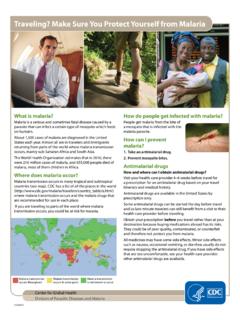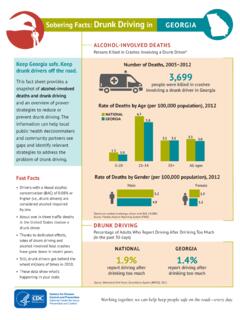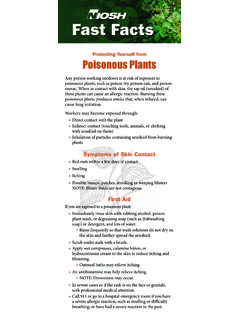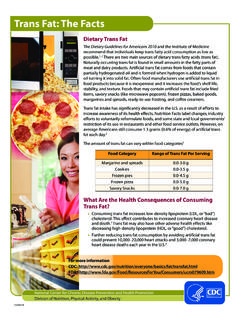Transcription of Talking with Your Teens about Sex: Going Beyond 'the Talk'
1 Talking with your Teens about Sex: Going Beyond the Talk . Parenting a teen is not always easy. Youth need adults who are there for them especially parents* who will connect with them, communicate with them, spend time with them, and show a genuine interest in them. Talking with Teens about sex-related topics, including healthy relationships and the prevention of HIV, other sexually transmitted diseases (STDs), and pregnancy, is a positive parenting practice that has been widely A number of programs in a variety of settings ( , schools, parents' worksites) have been shown to increase the amount and quality of communication between parents and their This fact sheet offers practical actions for parents to help strengthen their efforts to engage positively with their Teens and to have meaningful discussions with them about sex. This information complements other available parent resources (see selected list on page 3) by emphasizing the importance of Talking with Teens about sex and healthy relationships.
2 * In this fact sheet, parent refers to the adult primary caregiver(s) of an adolescent's basic needs. These caregivers could include biological parents, other biological relatives, or non-biological parents. Does Talking with Teens about sex make a difference? According to Teens , the answer is yes. In national surveys conducted by The National Campaign to Prevent Teen and Unplanned Pregnancy, Teens report that their parents have the greatest influence over their decisions about sex more than friends, siblings, or the media. Most Teens also say they share their parents' values about sex, and making decisions about delaying sex would be easier if they could talk openly and honestly with their According to many researchers, the answer is yes. Studies have shown that Teens who report Talking with their parents about sex are more likely to delay having sex and to use condoms when they do have Parents should be aware that the following important aspects of communication can have an impact on teen sexual behavior:7.
3 What is said how it is said how often it is said how much Teens feel cared for, and understood by, their parents National Center for HIV/AIDS, Viral Hepatitis, STD, and TB Prevention Division of Adolescent and School Health What can parents do? When parents communicate honestly and openly with their teenage son or daughter about sex, relationships, and the prevention of HIV, STDs, and pregnancy, they can help promote their teen's health and reduce the chances that their teen will engage in behaviors that place them at risk. Following are some actions and approaches parents might take to improve communication with their teen about these challenging, hard-to- discuss health concerns. Stay informed about . Where your teen is getting information What health messages your teen is learning What health messages are factual and medically accurate your teen may be getting messages about sex, relationships, and the prevention of HIV, STDs, and pregnancy from a variety of sources, including teachers, friends, health care providers, television, and social media.
4 Some of these messages may be more accurate than others. Don't assume that your teen's health education class includes the information you want your child to know school-based curricula vary from state to state. Identify unique opportunities to have conversations with your teen, such as In the car. The car is a private space where your teen doesn't have to look at you but can hear what you have to say. Immediately following a relevant TV show/movie. Characters on TV shows and movies model many behaviors, and certain storylines may provide the opportunity to reinforce positive behavior or discuss the consequences of risky behavior. Through text messaging, which may provide an easy, acceptable way to reinforce messages discussed in-person. Have frequent conversations. Although you may know that having the talk with your teen about sex and HIV, STD, and pregnancy prevention is important, having a series of discussions that begin early, happen often, and continue over time can make more of a difference than a single conversation.
5 Be relaxed and open. Talking about sex, relationships, and the prevention of HIV, STDs, and pregnancy may not always be comfortable or easy, but you can encourage your teen to ask you questions and be prepared to give fair and honest answers. This will keep the door open for both of you to bring up the topic. It's OK to say you're feeling uncomfortable or that you don't have all the answers. Avoid overreacting. When your teen shares personal information with you, keep in mind that he or she may be asking for your input or wants to know how you feel. Let your teen know that you value his or her opinion, even if it is different from yours. Provide opportunities for conversations between your teen and health care professionals. By taking your teen to regular, preventive care appointments and allowing time alone with the provider, you create opportunities for your teen to talk confidentially with doctors or nurses about health issues that may be of concern, including HIV, STDs, and pregnancy.
6 Be prepared to suggest that you step out of the room for a moment to allow for this special time, as not all health care providers will feel comfortable asking you to leave the room. Talking with your Teens about Sex: Going Beyond the Talk . 2 November 2014. What topics should parents discuss with their Teens ? It's important that your conversations with your teen not focus just on the consequences of risky sexual behaviors. Many Teens receive these messages in health education class or elsewhere. As a parent, you have the opportunity to have discussions with your teen about other related topics. You can Talk about healthy, respectful relationships. Communicate your own expectations for your teen about relationships and sex. Provide factual information about ways to prevent HIV, STDs, and pregnancy ( , abstinence, condoms and contraception, and HIV/STD testing). Focus on the benefits of protecting oneself from HIV, STDs, and pregnancy.
7 Provide information about where your teen can speak with a provider and receive sexual health services, such as HIV/STD testing. How can parents improve their communication skills? Various organizations have developed programs to help build parents' skills and improve parent-adolescent communication. These skill-building programs may be implemented in schools, health clinics, community-based settings, and even places where parents work (see Table 1 for selected examples). Parents, educators, health care providers, community- based staff, and employers can work together to promote positive communication between parents and adolescents about sex. Where can parents get more information? Centers for Disease Control and Prevention. Positive Parenting Practices Centers for Disease Control and Prevention. Teen Pregnancy: Parent and Guardian Resources Office of Adolescent Health. Talking with Teens .
8 Teens and Parents Talking Advocates for Youth. Parent-child communication: Promoting sexually healthy youth The National Campaign to Prevent Teen and Unplanned Pregnancy. Parent-adolescent communication about sex in Latino families: a guide for practitioners sex-latino-families Department of Health and Human Services. Talk to your Kids about Sex relationships/talk-to- your -kids- about -se x Talking with your Teens about Sex: Going Beyond the Talk . 3 November 2014. Table 1. Selecteda Programs for Parents to Improve Parent-Adolescent Communication about Sex What is the program Which parenting practices Where has the program Who has participated? called? are addressed? been implemented? General parent-teen Parents Matter communication African American parents and/or guardians of Community-based Parent-teen communication pre- Teens 9- to 12-years-old organizations parentsmatter/ about sex (4th and 5th graders).
9 Parental monitoringb General parent-teen Families Talking Together communication (Linking Lives) Parents and/or guardians of Pediatric clinics Parent-teen communication African American or Latino about sex youth Schools parents/parent-materials/. Parental monitoring Talking Parents, Healthy Teens Communication (general and about sex) Parents and/or guardians of Worksites org/?programs= 6th to 10th graders Parental monitoring Talking -parents-healthy- Teens a These programs have been evaluated and shown to improve parent-adolescent communication about The selected examples illustrate different audiences of focus, including parents of elementary, middle, and high school students, as well as the variety of settings in which programs can be implemented, including community-based organizations, schools, and worksites. b Parental monitoring occurs when parents make a habit of knowing about their Teens ( , what they are doing, whom they are with , and where they are), setting clear expectations for behavior, and regularly checking in with their Teens to be sure these expectations are being met.
10 References 1. DeVore ER, Ginsburg KR. The protective effects of good parenting on adolescents. Current Opinion in Pediatrics 2005;17:460 65. 2. Wight D, Fullerton D. A review of interventions with parents to promote the sexual health of their children. The Journal of Adolescent Health 2013;52:4 27. 3. Akers AY, Holland CL, Bost J. Interventions to improve parental communication about sex: A systematic review. Pediatrics 2011;127:494 510. 4. Sutton MY, Lasswell SM, Lanier Y, et al. Impact of parent-child communication interventions on sex behaviors and cognitive outcomes for Black/African-American and Hispanic/Latino youth: A systematic review, 1988 2012. The Journal of Adolescent Health 2014;54:369 84. 5. Albert B. (2012). with one voice: America's adults and Teens sound off about teen pregnancy. Washington, DC: The National Campaign to Prevent Teen and Unplanned Pregnancy.













